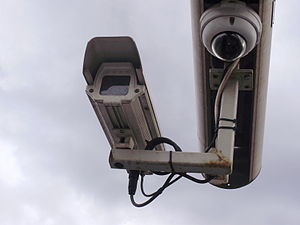Your Plot is Being Watched
In a short story in progress, I’ve got a main character who must break the law. However, I’ve got a bit of trouble: this story is set about 20 years in the future, and in 2033 we can expect to be on camera everywhere, all the time, inside and outside our houses. So how on Earth will we get away with a single misdemeanor or venal crime?
And how can an author now write about a future America and find ways to create tension and drive plot (i.e., have characters act badly) if they’re going to get found out in the next five hours or less?
Think about the killings in the Nite Owl that set off the plot in LA Confidential. The who-done-it is essential.

Now, the cops pull the coffee shop security-camera footage, look at it, and blip — there goes the mystery. At the very least, more cops than necessary would know who committed those killings, and that’s problematic for plotting.
The artistic power of the literary imagination can overcome a lot of things. But how can we recreate accurately a world that is fully on camera and still have characters get away with murder just long enough for a complete story?
Russians have become infamous for their dash cams, creating a crash-porn sub-genre on YouTube that must make J.G. Ballard fans woozy with pleasure. Americans are not very far away from total car-camerization, I’d say.
This specifically is what led me to this post: I wanted to have a character put something in a car, and perhaps also move the car, all of this a part of his wrongdoing. And then I thought, “In 2033, his every move will be on camera. He can’t get away with this long enough for the rest of the story to happen.”
To drive plot in contemporary and futuristic fictions is to either write around the surveillance, or necessitate failures in the technology that stretch credulity. Realism, naturalism, and a contemporary verisimilitude are each still key to story telling. Even fantasy fiction has to have some kind of baseline of technology in a definable world; in other words, even in fantasy fiction characters have to be able to get away with some sort of action and temporarily outwit or defeat some form of control. You just can’t have your characters caught by every single red-light speed camera, or you’ll have no plot.
However, if I want a character to act in a fictional world intended to match this current, real, actual world, and this person must cross on foot any of the local bridges — the Frenchtown, Stockton, or Lambertville bridges — she or he can’t do so without being on camera, facially identifiable, because back around 2007 whatever state agency installed dome cameras on these bridges, electric eyes similar to the one in the photo above. So would I write fiction in which I simply pretend that such surveillance doesn’t exist and characters can get away with their misdeeds without being recorded, or, as I suggested, do I write around it, if that’s even possible?
In his well-known “10 Rules of Writing,” in the New York Times in July of 2001, Elmore Leonard — whose many plots thrive on sustained mystery — said, “I can’t allow what we learned in English composition to disrupt the sound and rhythm of the narrative.”
Leonard died without telling us how to combat the disruption of narrative caused by the ubiquity of surveillance.
# # #
